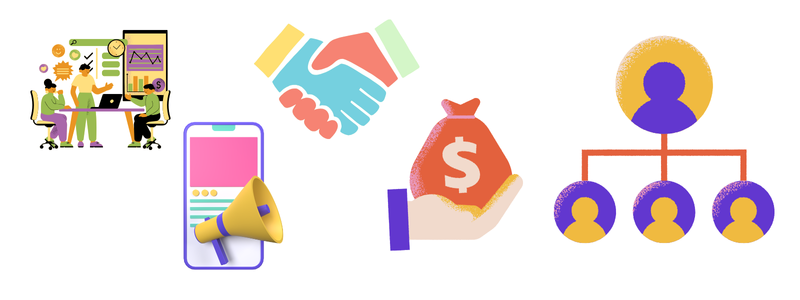Digital marketing refers to the use of digital channels, platforms, and technologies to promote products, services, or brands to consumers.

Table of Contents
Traditional marketing relies on physical mediums such as print ads, TV commercials, and billboards while digital marketing invests in the internet and electronic devices. This approach allows for more targeted, measurable, and interactive marketing strategies.
Digital Marketing Services
Digital marketing services comprises of a variety of tactics and strategies designed to help businesses reach their online marketing goals. These services can be designed to meet the specific needs of a business, whether they are looking forward to increase brand awareness, drive traffic, generate leads, or boost sales. The most common digital marketing services:
Search Engine Optimization (SEO):
On-Page SEO:
On-Page SEO refers to optimizing individual web pages to rank higher and earn more relevant traffic. This comprises using relevant keywords, creating high-quality content, and optimizing meta tags.
Off-Page SEO:
Off-page SEO refers to the activities which are conducted outside the website to improve its position in search rankings. This includes backlink building, social media marketing, and influencer outreach.
Content Marketing:
Creating and distributing valuable, relevant, and consistent content to attract and engage a clearly defined audience. This includes blogs, articles, videos, infographics, and eBooks.
Social Media Marketing (SMM):
Using social media platforms like Facebook, Instagram, Twitter, LinkedIn, and TikTok to promote products or services. This includes organic posts and paid advertising.
Pay-Per-Click (PPC) Advertising:
A model of internet marketing where advertisers pay a fee each time one of their ads is clicked. This is the amount which is shared by the companies to people who give these advertisers a platform to advertise or promote their products or services. Google Ads and Facebook Ads are popular PPC platforms.
Email Marketing:
Targeted emails are send to prospects and customers to build and expand relationships, inform about new products, and drive sales. This includes newsletters, promotional campaigns, and automated emails.
Affiliate Marketing:
To become partners with individuals or companies (affiliates) to promote products. Affiliates earn a commission for each sale or lead they generate through their platforms.

Influencer Marketing:
To collaborate with influencers who have a large and engaged following (followers) to promote products or services. This can include sponsored posts, product reviews, and giveaways.
Web Analytics:
Tools like Google Analytics must be used to track and analyze website traffic, user behavior, and other key metrics to improve marketing strategies and performance.
Conversion Rate Optimization (CRO):
The process of increasing the percentage of website visitors who take a desired action, such as making a purchase or filling out a form. This involves A/B testing, improving user experience, and refining calls-to-action.
Strategies in Digital Marketing
Integrated Digital Marketing Strategy:
To combine multiple digital marketing tactics into a cooperative strategy to achieve business goals. This ensures that all marketing efforts work together with harmony.
Personalization and Segmentation:
To Use data to deliver personalized content and experiences to different segments of your audience. This increases engagement and conversion rates.
Mobile Marketing:
To optimize marketing efforts for mobile devices, including mobile-friendly websites, apps, SMS marketing, and location-based services.
Video Marketing:
To create and to promote video content to engage and inform the audience. Platforms like YouTube, Facebook, Instagram, Vimeo, and social media channels are crucial for video marketing.
Remarketing/Retargeting:
To target ads to users who have previously visited your website or engaged with your content, encouraging them to return to your website and complete a desired action.
Local SEO and Marketing:
To optimize online presence to attract more business from relevant local searches. This includes local citations, Google My Business, and local reviews.
Best Practices in Digital Marketing
Know Your Audience:
To conduct surveys thorough market research to understand your target audience’s needs, preferences, and behavior.
Set Clear Goals:
To define specific, measurable, achievable, relevant, and time-bound (SMART) goals for your digital marketing campaigns.
Create High-Quality Content:
To focus on creating valuable and engaging content that resonates with your audience and provides solutions to their problems.
Use Data and Analytics:
To monitor regularly and analyze performance metrics to make data-driven decisions and optimize your marketing efforts.

Stay Updated with Trends:
Keeping up with the latest digital marketing trends and adapt your strategies accordingly to stay competitive.
Optimize for Mobile:
Ensuring your website and content are mobile-friendly to provide a seamless experience for mobile users.
By investing in these components and strategies, businesses can effectively reach and engage their target audience, drive traffic and sales, and achieve their marketing objectives.
Importance of Digital Marketing in Business
Digital marketing has become a crucial aspect of modern business strategies due to the increasing reliance on digital platforms by consumers. Here are several reasons why digital marketing is important for businesses:
Wider Reach and Audience Engagement:
Global Reach:
Digital marketing enables businesses to reach a global audience, breaking geographical barriers and expanding their market.
Targeted Advertising:
Businesses can target specific demographics, interests, and behaviors, ensuring that their marketing efforts reach the most relevant audiences.
Cost-Effectiveness
Lower Costs:
Digital marketing campaigns can be more cost-effective compared to traditional marketing methods like print or TV ads.
Higher ROI:
The ability to track and analyze digital campaigns allows businesses in optimizing their strategies and achieve a higher return on investment.
Measurable Results
Analytics and Data:
Digital marketing provides access to detailed analytics and data, enabling businesses to measure the effectiveness of their campaigns in real-time.
Performance Tracking:
Businesses can track key performance indicators (KPIs) such as traffic, engagement, and conversions evaluating their marketing efforts.
Enhanced Customer Interaction
Direct Communication:
Digital channels like social media, email, and live chat facilitate direct communication with customers, helps in improving engagement and customer satisfaction.
Personalization:
Digital marketing allows for personalized marketing messages based on customer data, leading to more relevant and effective communication.
Improved Conversion Rates
Targeted Campaigns:
By targeting specific audiences and tailoring marketing messages, businesses can improve their conversion rates and drive more sales.
A/B Testing:
Businesses can run A/B tests to determine the most effective strategies and optimize their campaigns for better performance.
Building Brand Reputation
Content Marketing:
Creating valuable content helps establish businesses as industry leaders and builds trust with the audience.
Social Proof:
Positive reviews, testimonials, and social media engagement contributing in building a strong and reputable brand image
Competitive Advantage
Staying Ahead:
Businesses that effectively use digital marketing strategies can stay ahead of their competitors by reaching audiences more efficiently and effectively.
Innovative Campaigns:
Digital marketing allows for creative and innovative campaigns that can differentiate a business from its competitors.
Flexibility and Adaptability
Real-Time Adjustments:
Digital marketing campaigns can be adjusted in real-time based on performance data, allowing businesses to respond quickly to market changes and consumer behavior.
Scalability:
Digital marketing strategies can be scaled up or down depending on business needs and goals.
Greater Customer Insights

Behavior Analysis:
Digital marketing tools provide insights into customer behavior, preferences, and purchasing patterns, helping businesses make informed decisions.
Feedback and Engagement:
Direct interaction with customers through digital channels provides valuable feedback that can be used to improve products and services.
Enhanced Customer Experience
Seamless Journey:
Digital marketing ensures a seamless and consistent customer journey across various digital touchpoints, improving the overall customer experience.
Convenience:
To provide easy access to information, products, and services online enhances customer satisfaction and loyalty.
Conclusion
Digital marketing is essential for businesses in today’s digital age. It offers numerous benefits, including wider reach, cost-effectiveness, measurable results, enhanced customer interaction, and improved conversion rates. By investing digital marketing strategies, businesses can build their brand reputation, gain a competitive advantage, and enhance the overall customer experience. Investing in digital marketing is crucial for businesses looking to grow, adapt, and thrive in an increasingly digital world.



2 thoughts on “Digital Marketing Services”